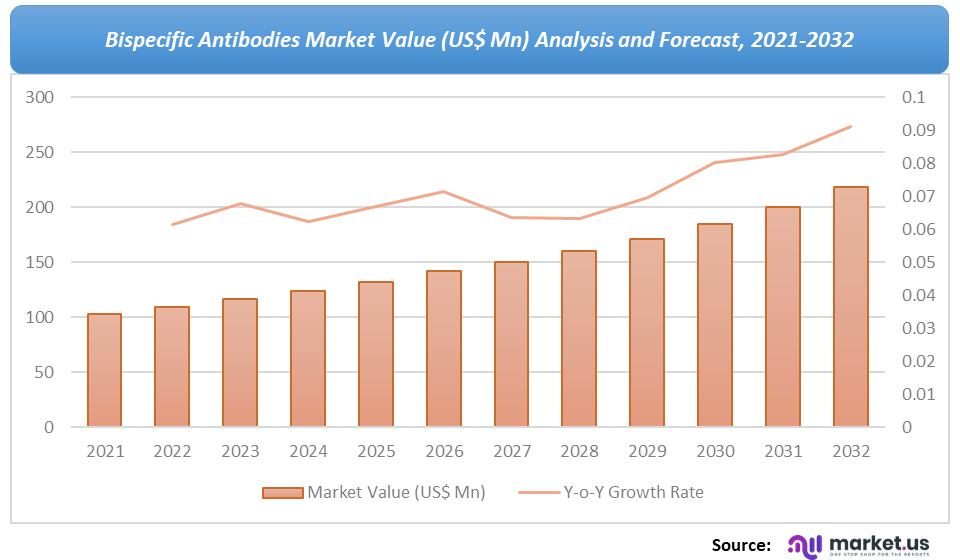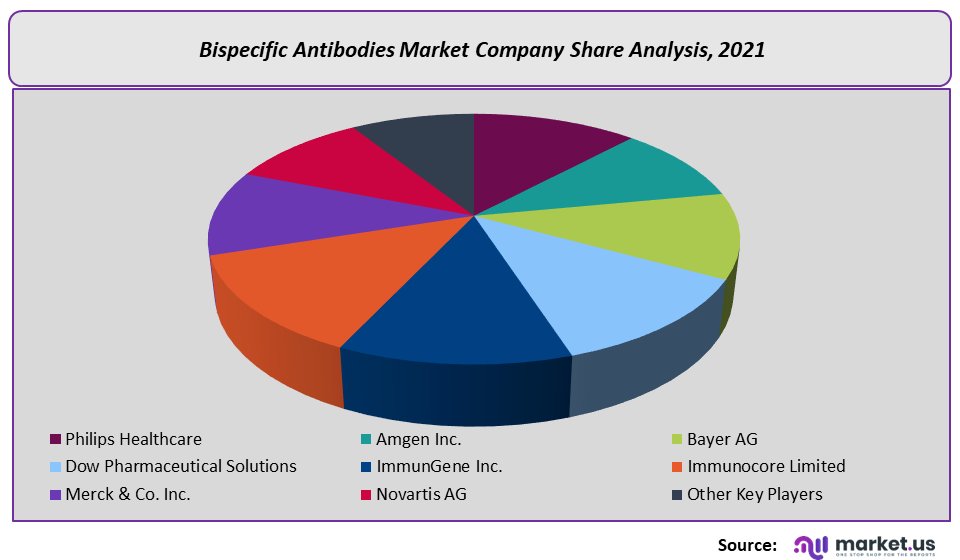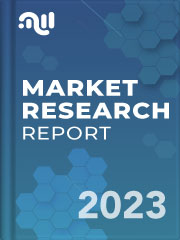Global Bispecific Antibodies Market By Product Type (Blinatumab, Catumaxomab, Duligotumab), Based on Indication (Bacterial Infections, Tumor Angiogenesis, Other Indications) By Region and Companies - Industry Segment Outlook, Market Assessment, Competition Scenario, Trends and Forecast 2022-2032
- Published date: Feb 2022
- Report ID: 77762
- Number of Pages: 251
- Format:
- keyboard_arrow_up
Bispecific Antibodies Market Introduction
Bispecific Antibodies are known as artificial proteins since they are made up of two or more antigen-recognition components that are linked together to produce a single construct. Bispecific antibodies can bind to two or more targets at the same time. Furthermore, these antibodies have the ability to connect two targets and have a high likelihood of achieving therapeutic effects (bringing cancer cells within striking distance). Bispecific antibodies in various formats include bispecific antibodies with particular heterodimerization domains, quadromas, and bispecific antibodies of minimal size.
Bispecific antibodies are largely used in cancer treatment and are emerging as a revolutionary technique for two targeting strategies within a single molecule for cancer treatment. Bispecific antibodies improve and ensure the following properties in a cancer-targeted agent: binding ability, selectivity, and efficacy. Bispecific antibodies have been found to be more effective in cancer treatments than the combination therapy provided by the other two antibodies. Recombinant DNA technology is widely acknowledged as the foundation for the rapid expansion of bispecific antibody forms.

Detailed Segmentation
Based on Product Type:
- Blinatumab
- Catumaxomab
- Duligotumab
Based on Indication:
- Infectious Diseases
- Viral Infections
- Cancer Diagnostics
- Gene Therapy
- Signaling Pathways
- Bacterial Infections
- Tumor Angiogenesis
- Other Indications
Based on Region:
- North America
- Europe
- Asia-Pacific
- South America
- Middle East & Africa
Market Dynamics
Drivers for the Global Bispecific Antibodies Market:
Bispecific antibodies are a new type of antibody that works by attaching to two distinct antigens. The dual-specificity of these molecules opens up a wide range of possibilities, including the simultaneous targeting of two separate signaling pathways, the dual targeting of various disease mediators, and the delivery of payloads to a specific spot. Furthermore, their reduced size improves their ability to penetrate a cell’s membrane. In recent years, the clinical benefits of these antibodies have fueled increased research efforts in this field.
Restraints Global Bispecific Antibodies Market:
However, the adverse effects of bispecific antibody therapies and tight regulations are expected to stymie the bispecific antibody therapeutics market in the coming years.
Opportunities for the Global Bispecific Antibodies Market:
Two bispecific antibodies, Blincyto and Hemlibra, have been approved for therapeutic use to date. Approvals for these bispecific antibodies have substantially altered the industry, as seen by the significant sale of these medications since their approval. The increasing popularity and therapeutic potential of bispecific antibodies can be linked to an increase in the number of clinical trials. Over 300 bispecific candidates are now in preclinical/clinical research and are likely to enter this market within the next 5-8 years.
Trends for the Global Bispecific Antibodies Market:
The evolution of science and technology, as well as advances in protein engineering, have resulted in the development of designer or multi-specific antibodies. As these designer antibodies have numerous advantages in terms of biological activities, it is expected that interest in employing them in a variety of therapeutic applications will increase in the future. Furthermore, when compared to monoclonal antibodies, these antibodies have a tiny molecular size, allowing for greater penetration in target cancer cells, as well as the potential to cross the blood-brain barrier. On account of the greater interest in these molecules, various bispecific and tri-specific antibodies have been developed for the treatment of several disorders.
Competitive Landscape
- Philips Healthcare
- Amgen Inc.
- Bayer AG
- Dow Pharmaceutical Solutions
- ImmunGene Inc.
- Immunocore Limited
- Merck & Co. Inc.
- Novartis AG
- Pfizer Inc.
- F. Hoffmann-La Roche AG.
- Other Market Players

Recent Development
In September 2018, researchers from China Pharmaceutical University created and generated a fully human, bispecific, single-chain diabody that can bind to VEGF165 and programmed death-1 in Pichia pastoris.
In August 2018, UCB Pharma, a Belgian scientific research company, studied the molecular factors in bispecific antibody multimerization and discovered that the monomer level of single-chain variable fragment-containing bispecific antibody formats can be increased by converting the single-chain variable fragment to a disulfide-stabilized single-chain variable fragment.
![Bispecific Antibodies Market Bispecific Antibodies Market]() Bispecific Antibodies MarketPublished date: Feb 2022add_shopping_cartBuy Now get_appDownload Sample
Bispecific Antibodies MarketPublished date: Feb 2022add_shopping_cartBuy Now get_appDownload Sample - Philips Healthcare
- Amgen Inc.
- Bayer AG Company Profile
- Dow Pharmaceutical Solutions
- ImmunGene Inc.
- Immunocore Limited
- Merck & Co. Inc.
- Novartis AG Company Profile
- Pfizer Inc Company Profile
- F. Hoffmann-La Roche AG.
- Other Market Players
- settingsSettings
Our Clients
|
Single User
$5,999
$2,999
USD / per unit
save 50% |
Multi User
$7,999
$3,499
USD / per unit
save 55% |
Corporate User
$12,999
$4,499
USD / per unit
save 65% | |
|---|---|---|---|
| e-Access | |||
| Data Set (Excel) | |||
| Company Profile Library Access | |||
| Interactive Dashboard | |||
| Free Custumization | No | up to 10 hrs work | up to 30 hrs work |
| Accessibility | 1 User | 2-5 User | Unlimited |
| Analyst Support | up to 20 hrs | up to 40 hrs | up to 50 hrs |
| Benefit | Up to 20% off on next purchase | Up to 25% off on next purchase | Up to 30% off on next purchase |
| Buy Now ($ 2,999) | Buy Now ($ 3,499) | Buy Now ($ 4,499) |








